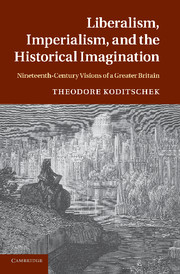 Liberalism, Imperialism, and the Historical Imagination
Liberalism, Imperialism, and the Historical Imagination Book contents
- Frontmatter
- Contents
- Acknowledgements
- List of abbreviations
- Introduction
- 1 Imagining Great Britain: Union, Empire, and the burden of history, 1800–1830
- 2 Imagining a British India: history and the reconstruction of Empire
- 3 Imagining a Greater Britain: the Macaulays and the liberal romance of Empire
- 4 Re-imagining a Greater Britain: J. A. Froude: counter-romance and controversy
- 5 Greater Britain and the “lesser breeds”: liberalism, race, and evolutionary history
- 6 Indian liberals and Greater Britain: the search for union through history
- Epilogue: From liberal imperialism to Conservative Unionism: losing the thread of progress in history
- Index
- References
5 - Greater Britain and the “lesser breeds”: liberalism, race, and evolutionary history
Published online by Cambridge University Press: 04 April 2011
- Frontmatter
- Contents
- Acknowledgements
- List of abbreviations
- Introduction
- 1 Imagining Great Britain: Union, Empire, and the burden of history, 1800–1830
- 2 Imagining a British India: history and the reconstruction of Empire
- 3 Imagining a Greater Britain: the Macaulays and the liberal romance of Empire
- 4 Re-imagining a Greater Britain: J. A. Froude: counter-romance and controversy
- 5 Greater Britain and the “lesser breeds”: liberalism, race, and evolutionary history
- 6 Indian liberals and Greater Britain: the search for union through history
- Epilogue: From liberal imperialism to Conservative Unionism: losing the thread of progress in history
- Index
- References
Summary
The doctrine of evolution is nothing else than the historical method applied to the facts of nature; the historical method is nothing else than the doctrine of evolution applied to human societies and institutions.
F. Pollock, Oxford Lectures (Oxford, 1890), 41We are now in a position to trace out all that the Comparative method of inquiry has to tell us of the earliest political state of that branch of mankind to which we ourselves belong. We are now ready to stand face to face with our kinsmen … In this mighty drama of European and Aryan history, three lands, three races, stand before all others, as those to whom, each in its own day, the mission has been given to be the rulers and teachers of the world … The Greek, the Roman, and the Teuton, each in his own turn stands above the other nations of the Aryan family. Each in his turn has reached the highest stage alike of power and civilization that was to be had in his own age, and each has handed on his own store to be further enriched by successors who were at once conquerors and disciples.
E. A. Freeman, Comparative Politics [1873] (London, 1896), 24–5This would be a grand land if only every Irishman would kill a negro, and be hanged for it.
E. A. Freeman to F. H. Dickinson, New Haven, Connecticut, December 4, 1881, in W. R. Stephens, The Life and Letters of Edward A. Freeman (London, 1895), II: 242- Type
- Chapter
- Information
- Liberalism, Imperialism, and the Historical ImaginationNineteenth-Century Visions of a Greater Britain, pp. 206 - 262Publisher: Cambridge University PressPrint publication year: 2011
